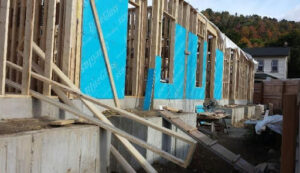Like the rest of the Canadian economy, housing construction will take a big hit from President Trump’s tariffs on Canadian exports to the U.S. and Canada’s retaliatory tariffs on U.S. goods coming to Canada. Everything about our economy has become much more uncertain. The Bank of Canada has estimated that the modest (1.8%) economic growth it had predicted for 2025 and 2026 could be wiped out. With major job losses as well as rising inflation, demand for private-sector housing and private-sector construction will decline, perhaps sharply.
That makes this the ideal time for significantly larger—and long overdue—government investments in non-profit and co-op affordable homes, including apartments. There’s already money budgeted for 2024-5 that needs to be spent by the end of March or the funding is gone.
 Housing construction in the Hamilton area (including Burlington and Grimsby) already saw a slowdown in 2024, with construction started on just 2,630 housing units, down sharply from 3,700 in 2023. Almost all were for-profit projects and few would have been affordable for even middle-income households. This year will likely see even fewer.
Housing construction in the Hamilton area (including Burlington and Grimsby) already saw a slowdown in 2024, with construction started on just 2,630 housing units, down sharply from 3,700 in 2023. Almost all were for-profit projects and few would have been affordable for even middle-income households. This year will likely see even fewer.
Government-funded non-profit housing would keep up construction activity. More importantly, it would begin to meet the already desperate need for housing for middle- and lower-income households and individuals—a need that is likely to spiral up as the economy slows. Governments could reduce the surge in unemployment and create economic stimulus while meeting a massive human need and building long-term economic resiliency, a quadruple win. Most economically advanced countries kept building large numbers of non-profit, affordable housing, whereas Canada has built relatively few since 1993, under both Liberal and Conservative governments.
However, speed and political will are essential. Governments have until the end of March to spend all the money budgeted for housing. Each year, the federal government fails to spend about $600 million that Parliament approved for housing. During an affordability crisis, that’s outrageous. This year more than ever, Canada Mortgage and Housing Corporation needs to approve every eligible project for which there is approved funding by March 31. Whoever forms the government after March 31 will need to significantly expand funding for non-profit and co-op housing as part of its response to the tariff impacts.
Our Affordable Housing Team has long called for investments by the federal and provincial government sufficiently large to at least double the existing stock of non-profit, affordable housing over a decade. Investment to date have produced only a tiny fraction of what is needed. Perhaps the need for economic stimulus now will finally prompt the funding for the new units that tens of thousands of Hamilton households badly need and that Hamilton non-profit housing providers are ready to build.
Email or write the Minister of Housing, Nate Erskine-Smith, with a simple, urgent message, drawing on the argument above: The need is urgent. Timing is crucial. Spend every dollar budgeted for non-profit, co-op, Indigenous and other housing programs, now, before those budget allocations die at the end of March. Longer term, provide the funding needed to at least double the number of non-profit and co-op housing units across the country. Email: The Honourable Nathaniel Erskine-Smith, P.C., M.P., Minister of Housing, Infrastructure & Communities, Nathaniel.Erskine-Smith@parl.gc.ca and Minister-Ministre@infc.gc.ca Letter: The Honourable Nathaniel Erskine-Smith, P.C., M.P., Minister of Housing, Infrastructure & Communities, House of Commons, Ottawa K1A 0A6. You don’t need a stamp. Please let the Housing Team know if you send that email with a note to housing@uuhamilton.ca